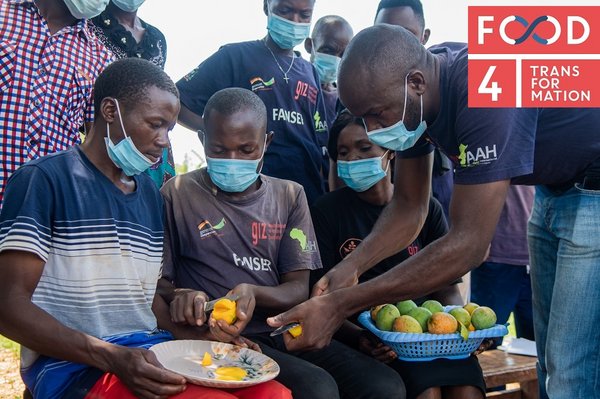 Read this article in French
Read this article in French- Share this article
- Subscribe to our newsletter
GIZ project ‘Food Security and Enhanced Resilience’ – nutrition is not just a women’s issue
Women and girls are more frequently affected by all forms of malnutrition. Therefore, food security measures must be primarily geared towards reinforcing this target group. However, many interventions to empower women often fail to adequately address the underlying roots of gender inequalities.
Men usually have decision-making power and control over household resources. Moreover, they often purchase consumer goods and food on the market and manage the family’s income.
In addition to promoting the human right to adequate food, the Global Project ‘Food Security and Enhanced Resilience’ run by Deutsche Gesellschaft für Internationale Zusammenarbeit (GIZ) GmbH thus focuses on promoting gender awareness and transformation concepts. Men are directly targeted as indirect beneficiaries in project implementation.
The inclusion of men and other household members (e.g. grandparents, mothers-in-law, etc.) is hence an essential prerequisite for sustainable change in dietary diversity and hygiene habits in the household.
Several previously established interventions show that the integration of men is central to sustainably addressing gender roles and stereotypes, empowering women and thus creating a solid foundation for achieving project objectives. Gender transformation approaches must be enshrined in the structure of the programme. Furthermore, the measurability of behavioural changes must be improved and assured in order to verify the effects of these measures.
The following project examples are intended to illustrate some of the implemented concepts.
Burkina Faso – creating awareness via “soap operas” and “schools for men”
In Burkina Faso, soap operas are used to reach a large audience and raise awareness about the core messages of gender transformation approaches in a clear way. This approach is highly effective because the scenes were inspired by the everyday life of the communities. The film provokes laughter and stimulates reflection. It encourages men to participate in promoting good nutrition and hygiene practices. It also motivates them to empower their wives, for example, by participating in household decision-making processes and contributing to the cultivation of land for food production.
Another approach in Burkina Faso is the ‘schools for men’. This type of peer education is also implemented in a similar form in Malawi, Togo and Zambia. Exchanges provide space for reflection and decision-making between community-designated male role models and other men in the village community to encourage them to adopt positive habits.
The members of the ‘École des Maris’ (School of Husbands) meet continuously and take part in training sessions on selected topics. Together, they identify ‘small feasible actions’ that have a positive impact on the household, such as participating in feeding the family, planting a vegetable garden and other household tasks. They are also encouraged to accompany their partner to visit health centres.
“Father 2 father groups” – rethinking gender-based stereotypes
“Father 2 Father Groups’ in Malawi encourage other men to rethink gender-based stereotypes. Community volunteers are empowered to facilitate gender dialogues for men and women. The objective is to challenge beliefs, norms and practices related to roles, responsibilities and decision-making powers within the household.
The groups also organise cooking demonstrations, presented by men, where different foods are introduced and men learn how to prepare individual meals.
This type of intervention is also being piloted in Togo. Trained men sensitise their relatives and acquaintances, especially other men in the villages, about nutrition-related issues. However, here, it quickly became apparent that these men had little impact on changing the behaviour of other men. In future, the project will therefore increasingly involve local male authorities (Chef de Village, Leader Communautaire, etc.).
Apart from that, the nutrition education offered to men was not sufficient to stimulate behavioural change. Since then, awareness-raising events lasting several days have been organised. Although these results may initially feel negative, failures in the conceptualisation of a goal also produce important insights. Therefore, they should definitely be included in the continuous development of the measures.
Pilot groups by men for men have also been set up to support behavioural change in Zambia. Carefully selected, specially trained members from village communities, called gender champions, facilitate focus group discussions once a quarter to discuss gender inequalities and harmful cultural practices. The goal is to contribute to shared decision-making, promoting understanding of roles and responsibilities, and to healthy eating.
Author: Julia Kummer, Deutsche Gesellschaft für Internationale Zusammenarbeit (GIZ) GmbH, Global Progamme Food Security and Enhanced Resilience’, Bonn, Germany
This article is an abridged version of the article “Nutrition is not just a women’s issue”, which appeared in the newsletter “Food4transformation”.





Add a comment
Comments :
Kindly guide on how i can contribute articles on achieving healthy diets